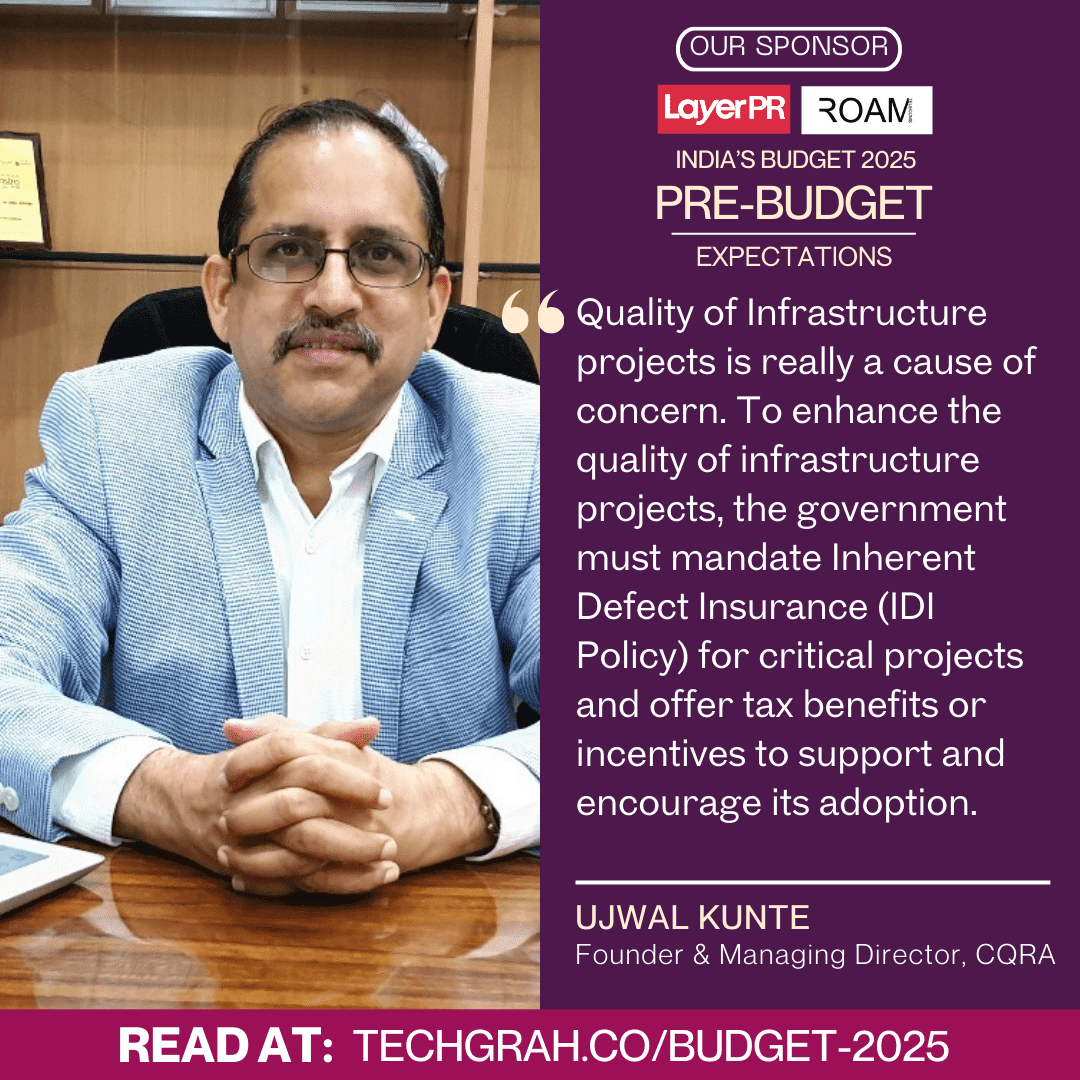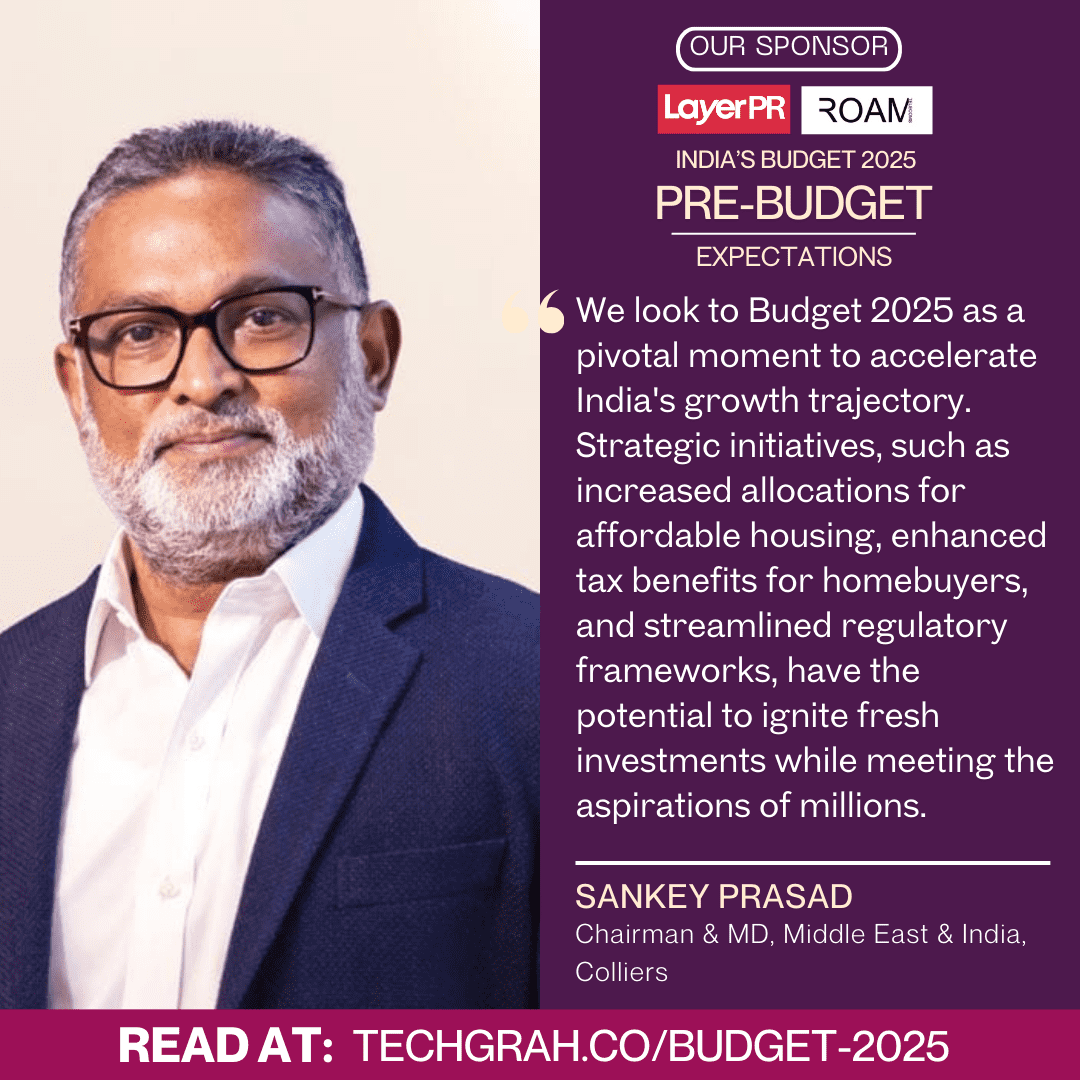With just days to go before the Union Budget 2025, leaders from the real estate and infrastructure sectors are calling for policies to address affordability and investment concerns. Chief among their demands is an increase in the housing loan tax exemption under Section 24(b) to ₹5 lakh, a step they argue could alleviate financial burdens on homebuyers and reignite demand.
Additionally, industry voices are pushing for the return of the Credit Linked Subsidy Scheme (CLSS) to expand homeownership opportunities for first-time buyers, underscoring the sector’s focus on targeted reforms.
Read the Union budget 2025 expectations in detail from the Real estate and Infra sector:
Ashish Kukreja, Founder & CEO, Homesfy & Mymagnet

The arrival of the Union Budget 2025 marks a crucial juncture for the real estate sector, poised at the intersection of challenges and opportunities. Industry stakeholders are pushing for bold and transformative actions to tackle high costs, improve affordability, and sustain the sector’s growth trajectory.
One key proposal is to raise the tax exemption limit on housing loans under Section 24(b) of the Income Tax Act from ₹2 lakh to ₹5 lakh. This adjustment alone could offer substantial financial relief to homebuyers, stimulating demand, especially within the middle-income bracket. Furthermore, reintroducing the Credit Linked Subsidy Scheme (CLSS) for first-time homebuyers could play a pivotal role in advancing the “Housing for All” initiative, facilitating increased homeownership for millions.
On the supply side, reinstating the 100% tax exemption under Section 80-IBA of the Income Tax Act for affordable housing projects is crucial. This incentive, which expired in 2022, incentivized developers to prioritize affordable housing—a sector vital for meeting India’s urban and rural housing requirements. Its reintroduction is likely to reignite interest and investments in this essential segment.
In 2024, housing prices surged by 21%, and a modest increase is projected for 2025. An anticipated repo rate reduction of 50 basis points or more in 2025 will lead to lower interest rates, enhancing housing affordability.
A well-balanced budget incorporating these initiatives has the potential to breathe new life into India’s real estate landscape and significantly contribute to the nation’s journey towards its ambitious $5 trillion economy target. By addressing affordability, boosting demand, and promoting sustainable growth, the Union Budget 2025 could establish a sturdy and inclusive foundation for the real estate sector.
Ujwal Kunte, Founder and Managing Director, CQRA

Quality of Infrastructure projects is really a cause of concern. To enhance the quality of infrastructure projects, the government must mandate Inherent Defect Insurance (IDI Policy) for critical projects and offer tax benefits or incentives to support and encourage its adoption.
Manojkumar Sharma, Founder, Ashnam Home

To bolster India’s home decor manufacturing sector, it is essential to expand and simplify Production Linked Incentive (PLI) schemes, reduce GST rates on home decor items, and introduce special credit schemes for startups. These measures will not only encourage domestic production, enhance competitiveness, and support small and medium-sized businesses, but also pave the way for a potential surge in consumer demand.
Additionally, implementing subsidies for advanced manufacturing technologies and increasing export incentives will facilitate technology adoption and encourage startups to explore global markets. Infrastructure development is crucial, as it focuses on improved logistics and reliable utilities to reduce operational inefficiencies.
Promoting made-in-India through incentives for eco-friendly and other manufacturing practices and launching skill development initiatives for artisans will address both the skill gap and global demand for sustainable products. Finally, supporting e-commerce growth by reducing compliance costs and simplifying regulatory requirements cannot only help startups thrive but also foster a culture of innovation in this dynamic sector.
Darshan Govindaraju, Director, Vaishnavi Group

As the real estate sector inches closer to the $1 trillion mark by 2030, the upcoming budget should address the sector’s long-standing demands, according to industry status, providing input credit on GST while unlocking new regions through policy interventions for decluttering our major cities. This will ensure the liveability quotient is maintained while helping increase the organized share of the real estate sector, eventually benefitting the end consumer.
In addition to this, increasing the disposable incomes in the hands of homebuyers will help maintain a healthy demand-supply equilibrium while helping achieve the government’s vision of housing for all. It also becomes pertinent in our view to focus on the other developments within the sector including the rollout of incentives for constructing green buildings, adoption of alternate construction techniques, and working on reducing input cost of materials to drive sustainability affordably.
This will ensure a win-win situation for homebuyers, developers, and the environment while making sustainability an effective business case. As one of the fastest-growing real estate developers in the country, we have been at the forefront of identifying new pillars of growth with green buildings and the inclusion of technology in construction while shielding the business from market shocks.
Angad Bedi, Chairman & MD, BCD Group

The Union Budget 2024 allocated 11.11 lakh crore to infrastructure development and laid a solid foundation for India’s realty sector. This noteworthy initiative opened up significant opportunities in the residential and commercial segments while reducing stamp duty made property investments more accessible. However, the Union Budget 2024 fell short of addressing some critical long-standing demands of the realty sector.
Key areas like granting industry status to the real estate sector, which would ease access to institutional funding, were overlooked. Likewise, GST rationalization and reinstating input tax credit (ITC) remained unaddressed. These measures are vital for simplifying processes, reducing costs, and boosting efficiency. On the individual front, there were only marginal tax benefits under the new regime and no enhancements to home loan deductions under Sections 24(b) or 80EEA.
For Budget 2025, we anticipate focused attention on these unresolved issues. Rethinking the definition of affordable housing according to market realities and lowering GST rates can give an impetus to a more inclusive housing system. Most importantly, granting infrastructure status to the sector would improve access to funding at reduced interest rates. The government’s renewed focus on these aspects would ensure a thriving, resilient, and future-ready realty sector.
Shesh Rao Paplikar, Founder & CEO, BHIVE Workspace

The upcoming Union Budget 2025 presents a pivotal opportunity to sustain and enhance the growth momentum of India’s commercial realty sector, driven majorly of late by escalating demand for flexible office spaces. We expect this year’s Budget to introduce multiple fiscal incentives, tax benefits and reforms aimed at empowering developers and operators focused dedicatedly on the flexible workspace segment, as well as for businesses looking to redesign their offices with sustainability and hybrid work model in mind.
The Government must also consider classifying REITs as equity investment instruments, lowering TDS rates for coworking and managed office operators, and enabling them to claim Input Tax Credit under GST. Furthermore, supportive and future-facing policy measures to boost flexi-office and commercial space demand across tier 2, and tier 3 India and to further catalyze the country’s burgeoning startup and GCC ecosystems would be highly appreciated.
Last but not least, granting ‘industry status’ to India’s commercial real estate sector and reducing GST on commercial properties can become the ultimate game-changers and growth juggernauts over the long term. We sincerely believe these anticipated moves have the potential to turn India into a world-leading real estate powerhouse while fuelling the nation’s cherished aspiration of achieving ‘Viksit Bharat’.
Sankey Prasad, Chairman & MD, Middle East & India, Colliers

Building on the transformative momentum of 2024, which saw unprecedented demand and heightened consumer confidence in the Indian real estate sector, we look to Budget 2025 as a pivotal moment to accelerate India’s growth trajectory. Strategic initiatives, such as increased allocations for affordable housing, enhanced tax benefits for homebuyers, and streamlined regulatory frameworks, have the potential to ignite fresh investments while meeting the aspirations of millions.
At Colliers India, we firmly believe that a forward-looking and inclusive budget can unlock the sector’s full potential—driving economic resilience, shaping smarter urban landscapes, and championing sustainable growth for generations to come.
Bhavesh Kothari, Founder & CEO, Property First

With the Union Budget 2025 drawing closer, India’s realty sector looks for a more inclusive and growth-focused stance from the government. The emphasis on infrastructure by the government in previous budgets has been a commendable step; however, this year, we expect a more targeted approach toward easing the financial burden on homeowners and developers alike.
One key area of concern is the absence of tax relief and reforms to address the needs of home loan borrowers. We believe that offering greater tax benefits under the old tax regime would significantly ease the burden on homebuyers.
Another critical aspect that needs to be addressed is the long-standing call for the sector to be recognized as an industry. If approved, this would significantly improve access to funding, besides helping developers manage project costs more effectively and deliver projects on time.
This will ultimately reduce housing prices for buyers. Additionally, rationalizing GST rates and reinstatement of input tax credits (ITC) would simplify taxation and make housing more affordable for buyers. For the realty sector to thrive, policies that enhance liquidity and encourage private and foreign investments are crucial. A focused and balanced approach to these areas will help strengthen the housing market besides making it accessible, sustainable, and a catalyst for national growth.
Sunil Pareek, Executive Director, Assetz Property Group

India’s real estate sector has played a vital role in laying the foundation for the country’s economic development. The long-term demands of this sector must be addressed to unlock its next phase of growth. Some of these demands include granting industry status to the sector, implementing a single-window approval system, and providing input tax credits to developers.
The real estate sector is also playing a crucial role in supporting India’s commitment to Net Zero by 2070 by promoting sustainability. Policymakers should incentivize developers who are creating environmentally conscious projects, which will also increase the adoption of emerging technologies and innovative construction techniques. The real estate sector is poised to reach $1 trillion in market value by 2030, and with the right support, it can achieve this ambitious target.
Lachman Ludhani, Chairman and Managing Director, Evershine Group

The real estate sector has always thrived by turning challenges into opportunities, meeting the aspirations of homebuyers year after year. As we gear up for the Union Budget 2025, I see a landscape filled with promise, if we make a few strategic shifts. Affordable housing continues to gain momentum, reflecting the evolving needs of our nation.
While 2024 presented its challenges, I believe the upcoming budget can reignite home-buying interest by introducing crucial reforms in tax policies and enhancing subsidies for affordable housing. These steps will not only ease financial burdens but also open doors to growth and innovation.
With a clear focus and collective effort, I am confident that we can propel the industry forward, paving the way to achieve the ambitious $1 trillion target by 2030 and fulfilling the housing dreams of millions of Indians.
Chintan Vasani, Founder Partner, Wisebiz Developers

The recent data from CREDAI-MCHI highlights a remarkable shift in the Indian real estate market, with an 18% increase in total sales value, underscoring the growing demand for luxury homes.
This trend reflects a transformation in consumer preferences, where buyers are not just seeking premium properties but a curated lifestyle that aligns with their aspirations. The rise in average home prices to Rs 1.23 crore signifies a clear move towards quality and exclusivity.
As cities like Mumbai, Delhi-NCR, and Bengaluru lead this luxury market, we are witnessing a new era in real estate that prioritizes elevated living experiences.




